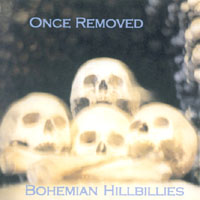Where I was
("Where were you when President Kennedy was shot?" the professionally perky TV talking heads have been asking all week, pretending to remember something that happened before they were even born. Not that I owe them an answer or anything, but here's my story.)
Forty years ago today, I was in Mrs. Fern Dougher's 6th grade class at Woodland Elementary School in Oak Ridge, Tennessee. Mrs. Dougher (pronounced as in "beware of evil doers," she always said) was near the end of a long teaching career, and she often nodded off for awhile after lunch if we were taking a test or otherwise working quietly. But on this day, she was wide awake: we were studying history, specifically the assassination of President Abraham Lincoln.
One member of our class wasn't in the room: a girl named Lila, who had had back surgery and was spending the entire school year in bed, in a cast and later a brace. She attended via intercom, and since I'd just transferred into the school, I'd never met her. As much as I felt for her, stuck there in a body cast, I admit I also resented her because no matter how hard I tried, no matter how good my work, Mrs. Dougher always praised Lila's work and nobody else's. She would wave Lila's latest report around and berate the class for not matching its presumed quality: "And her flat on her back!" Mrs. Dougher would always add. Mrs. Dougher gave me a D on my country report, because instead of copying passages verbatim from the encyclopedia as everyone else did to produce a 40- to 100-page report, I researched mine and then wrote far fewer pages of completely original material. I think Lila's report must have been 200 pages at least, and Mrs. Dougher waved it at us and shouted for weeks afterward.
[She wasn't the world's best teacher, but that school had a worse one: a fourth-grade teacher who was constantly reaching inside her blouse to adjust her undergarments, and who (before the Supreme Court decision on school prayer), would always send the one Jewish student in the class out into the hall for the religious instruction period, nearly spitting as she slammed the door behind him and muttered, "He don't bleve in Jesus!"]
So that afternoon as we took turns reading aloud from our textbooks about Abraham Lincoln and the Ford Theatre and John Wilkes Booth, we thought it was part of the lesson when Lila squawked through the intercom: "Mrs. Dougher! Mrs. Dougher! The president's been shot!"
Lila was indeed a smart girl, and thoughtful, too: with her mother's help, she put her AM radio next to the intercom and locked the "on" button in place, so that we could listen to the news along with her. And so we did until, after the President's death was officially confirmed, someone somewhere decided school would be dismissed early. There was no bell to end the day, not much organization. I found my second-grader brother in the crowd of students milling around outside the building, and we started walking home. We hadn't gotten far before Mom pulled up at the curb next to us. She drove straight to her parents' and we stayed there all weekend, watching the news unfold on television like the rest of the nation. On the way there, Mom told us what it was like when Roosevelt died: she remembered where she was and what she'd been doing when she heard the news. Forty years later, I don't remember what she told us, except that people were scared then, too.
posted by Janet Dagley Dagley @6:28 PM
|
22.11.03  |
Fili THIS, Buster!
A heartfelt thank you to the 40 Democrats and Republicans of the United States Senate who agreed to use the most effective tool available to them -- filibuster -- to prevent the House-approved energy bill from becoming law. Even Republican Senator John McCain describes the bill as a "Thanksgiving turkey" stuffed with goodies for special interests. However long it takes, I'm sure they won't run out of things to say.
posted by Janet Dagley Dagley @4:26 PM
|
21.11.03  |
Mister Guitar
Chet Atkins: Certified Guitar Player, Honorary Audio Engineer
We got a nice surprise in the mail today: 3 copies of the March 2003 issue of Mister Guitar magazine, the journal of the Chet Atkins Appreciation Society. The cover story is by yours truly -- it's an edited version of a piece I wrote about Chet Atkins when he addressed the Audio Engineering Society convention in 1999.
Here's the unedited version, published online in September, 1999:
It began with these words, projected on a large screen:
"Warning: Attempting to play guitar like Chet Atkins can lead to numbness in fingers, sleeplessness, and feelings of inadequacy."
And then a quotation from the man himself: "I told my dad I wanted to be a musician when I grew up, and he said, 'Son, you can't do both.' " A video presentation followed, chronicling Chet's progress from the hills of East Tennessee (near Knoxville) to the plateau of Middle Tennessee (Nashville) and all over the world along the way. Atkins, who uses the initials c.g.p. (certified guitar player) after his name, seemed to be looking at his hands in every clip they showed. To what end, I couldn't say, since his fingers often moved faster than the eye could follow.
The video ended as it had begun, with a screenful of text:
"And now, will you please welcome Mark Knopfler."
So we did. Knopfler said he understood those feelings of inadequacy very well - he first felt them when he listened to Chet Atkins records as a boy. "It was like guitar playing from another planet," he said. As we know, Knopfler grew up to be quite a guitar player himself, and a few years ago, Atkins called him up in England and asked him to come to Nashville to record with him. Knopfler wasted no time getting to the airport. When he landed in Nashville, Atkins was there to meet him, asking, "Want to go to the Gibson factory?" Eventually, they made it to Atkins's house, where Knopfler worked up his courage and got out his guitar. "I'm just trying not to shake, you know, and he says to his assistant, 'Hey Paul. He's got a thumb about as long as my foot.' I think that's what he said. Foot. Yeah, that was it.
"All sorts of people in Nashville got into the business through Chet, fed their families through Chet. And in listening to him tell the story of a small boy walking on a dirt road in the winter with no coat because his family didn't have money for one - he was that boy - I have learned that poverty engenders something: tremendous determination. Chet Atkins picked his way through poverty, picked his way to being the most admired guitar player in the world, and then he became one of the most successful producers in music," Knopfler said.
"Radio was probably the thing that fired Chet up most. He built his own radio when he was nine years old. Radio was exciting then." Knopfler was interrupted by applause at that point. When it subsided, he went on. "He gave up on the corporate system when it got to the point when he was having to fill out corporate performance reviews and all that. You know, 'Is your artist doing A, B, other? Is your artist male, female, other? Has your artist got one testicle....?' " More applause.
Chet Atkins was the first to mic a bass drum, on the song "Oh, Lonesome Me." He was the first to include the pedal steel guitar on a country song (seems like it's always been there, doesn't it?). "The records he made himself, he made at home. The record that we made, we made at home," Knopfler said.
Then Atkins himself made his way to the stage, slowly. He had helpers on either side as he walked, as well as a cane. We gave him a standing ovation. Knopfler's admiration and affection for Atkins was clear as he helped the c.g.p. onto a stool behind the podium, then stood at the back of the stage while Atkins talked. Atkins apologized for his condition: "I've had a brain tumor and a stroke and I can't remember a damn thing." He did fairly well, all things considered. At times he seemed to forget what he was talking about, or he'd pause to search for a word. But he'd look at his notes and get back on track, even if he wasn't at the same place on the track he'd been before. I've done my best to reproduce the highlights here. Tapes of the awards ceremony and keynote address are available at Confcopy.com, tape #01 of meeting #AU9901.
"Is Les Paul here today?" Atkins called out. The spotlight was on him, and the rest of the room was dark. And silent. "Hope he's not sick. I woulda come to yours, you know.
"My first guitar belonged to my brother Jimmy Atkins. Some of y'all might remember him. He came in one day from school, and I was playing with his guitar. I wasn't even old enough to go to school then, and I didn't know what to do with it. I put rocks in it and I was dragging it through the dirt and grass. That was in 1929."
At one point, Atkins got a little close to the mic and it popped. "Pardon the p," he said. My first engineer that came to Nashville, he wouldn't let anybody get close to a mic, afraid they'd pop a p, like I just did.
"The first radio I build, I got the coil out of a model T Ford. I took a wire from - what do you call that thing? - and I wrapped it around a piece of cedar wood. I put up an antenna and got WNOX in Knoxville. That was in 1935. The earpiece was one of those old-fashioned telephone receivers. Then I got to having asthma so bad, my mother wrote to Dad and told him to come and get me. I was too dumb to know how sick I was. If I hadn'ta been, I mighta died.
"That's a J-O-A-K," he explained.
"I built my second radio in 1938 or '39, bought the parts from Allied Radio in Chicago. I think that's now Radio Shack. For the tube I used an RK 43 dual-purpose tube. I saw the schematic in a magazine. We were building a school; it was one of Mrs. Roosevelt's things. Some of these days I'm going to build another radio, if anybody knows where I could get one of those RK 43 dual-purpose tubes.
"I feel kinda strange talking to all you engineers. My interest & knowledge of electronics is pretty weak.
"Merle Travis turned me onto fingerpicking. I already played finger-style, but not like I do now.
"I built a ham radio during the war, but they wouldn't let me use it. I went along with them. You don't want to play around with the government during a war."
At his first New York recording session, with Red Foley, "I sat there all day with my guitar in my hands and my amp turned on. And then Red - no, not Red Skelton. But I do have a drawing of a clown he gave me in a guitar case somewhere. I hope I still have it. I hear they're real valuable now. I sat through two sessions, and they never offered to use me. And finally on the last tune, a song Fred Rose had written, 'Lonely River Keep on Rolling,' they asked me, 'Could you play something along with this?' And I was just an arrogant kid from East Tennessee, I said, 'That's what I'm here for!' That song with Red was a slight hit, and I really enjoyed popping a dime in the jukebox and hearing myself play."
Atkins worked on several radio shows, and got fired several times. "I moved to Nashville in 1951. I was working in Springfield, Missouri, for $75 a week, and being no dummy, I called Fred Rose and asked him if he'd pay me that much. He asked me if I'd come and try to write some songs with Hank Williams. I came down here, and we were sponsored by Martha White Flour." Atkins began singing, not the Martha White theme, but the Powdermilk biscuits theme from A Prairie Home Companion. "Oh, wait. Garrison's not here," he said.
"I got a contract with RCA, so I came up here and recorded for 2 or 3 months. A fellow in Cairo, Illinois, designed an amp and brought it to me. I had been looking all over for echo or something to provide roominess. That was it. And there was some guy at Gretsch who kept after me to play one of their guitars, and finally I just said, 'I don't like your guitars.' And they guy said, 'Well, how about if you design one of your own?' I said sure. I wanted to be like Les Paul. So I called up Les and I asked him what royalty I should ask for for that, you know, like 3 percent or 5 percent of retail or wholesale. I don't know much about money. I never look at it or count it. Anyway, I forget what he told me."
Atkins was assigned to work with Elvis Presley in 1955, "and then they put me in charge of the country roster. I've always been good in the studio. My dad was a classical musician and my brother was a pop musician, and I - I don't know what I was. I was better than some of the older musicians, though, because I knew three chords instead of two."
Mark Knopfler stepped forward to help his mentor down from the stool and off the stage. We gave him another standing ovation.
posted by Janet Dagley Dagley @5:31 PM
|
20.11.03  |
Breaking news from Blogger: How not to get fired because of your blog
This just in from Blogger: How not to get fired because of your blog. The advice is too late for this Mac user who was temping at Microsoft. Here's the blog entry that cost him the job. Fortunately, he found another job right away.
posted by Janet Dagley Dagley @5:02 PM
|
19.11.03  |
THE LAW
___________________
Equal Protection
Having trouble understanding today's headline? It's simple: equal protection under the law, just like the U.S. Constitution says.
Today's ruling by the Massachusetts Supreme Court on same-sex marriage goes a long way, but now let's see what the Massachusetts state legislature comes up with in response. If it's civil unions or some other substitute for the rights and privileges associated with marriage, then it won't be equal protection, will it? In its ruling, the court cited the Massachusetts state constitution, which "forbids the creation of second-class citizens." On a federal level, the "Defense of Marriage Act" passed in 1996 attempts to do exactly that, though the federal courts have yet to rule on whether it is consistent with the U.S. Constitution.
posted by Janet Dagley Dagley @5:06 PM
|
18.11.03  |
Rearranging the neighborhood, remembering a revolution
On this gray November day, we salute the people of what was once Czechoslovakia on the 14th anniversary of the Velvet Revolution, the day they took to the streets and took their country back from the communists, with hundreds of injuries but not a single fatality. A few years later, on January 1, 1993, the Velvet Divorce ensued and the country split peacefully into two nations, the Czech Republic and Slovakia.
All the rearranging going on in our own neighborhood today seems like a fitting tribute. Here are some workers atop the Hudson Reporter building:
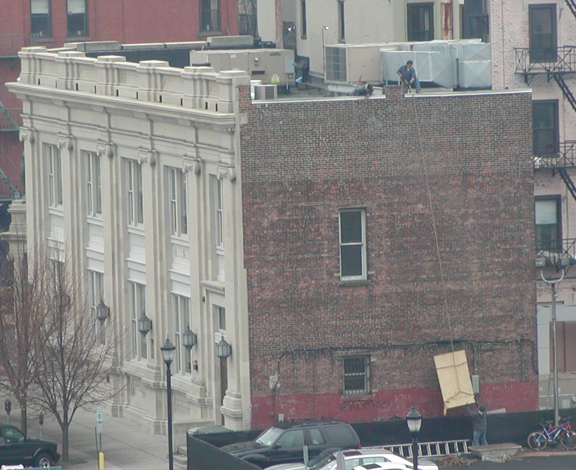
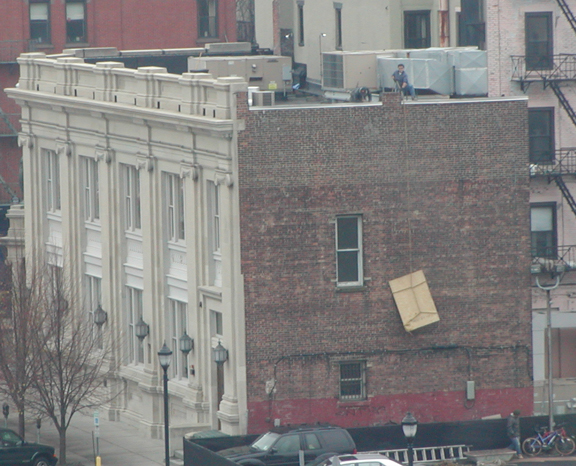
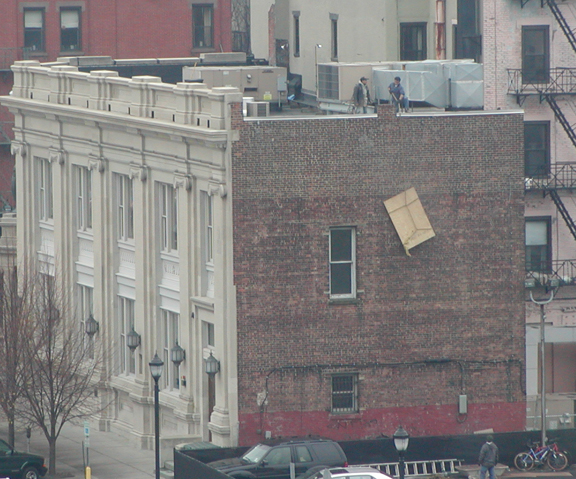
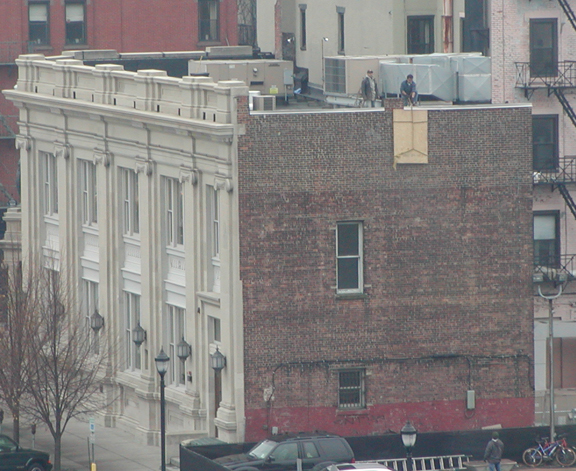
and nearby, more workers clearing the way for a brand new building:

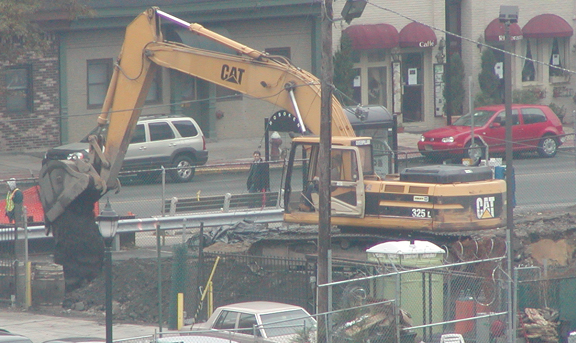
posted by Janet Dagley Dagley @5:18 PM
|
17.11.03  |
Dawn after dark
What a nice surprise! I decided it was time to show you what Jersey City looks like from the Empire State Building, but when I clicked on the Towercam I got a bonus: the Norwegian Dawn passing the Jersey City-Hoboken border on her way out to sea.

posted by Janet Dagley Dagley @5:39 PM
|
16.11.03  |
|


